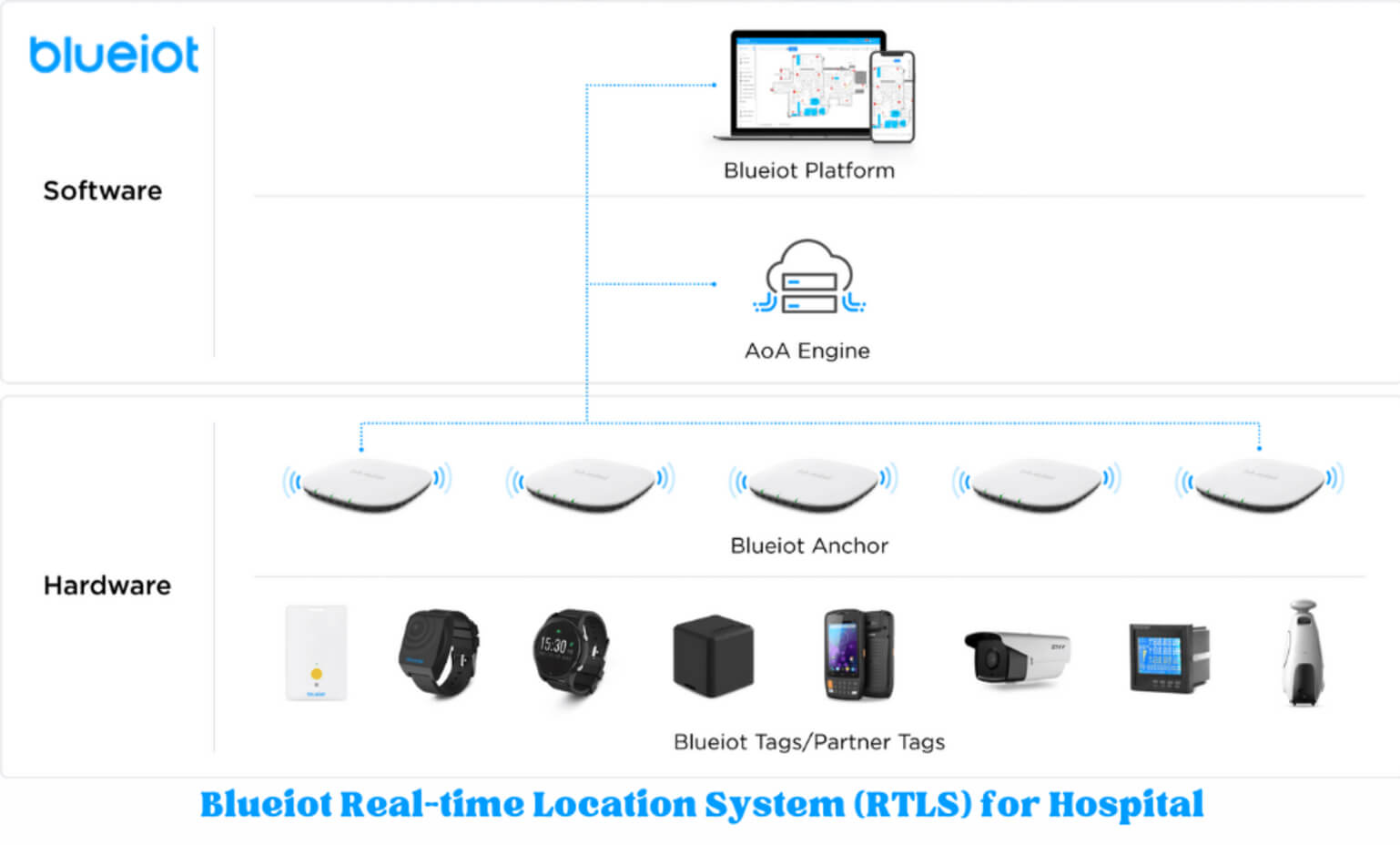

Enter your email to get our newsletter on best-in-class RTLS, AoA, and BLE solutions.
Nowadays, healthcare asset tracking faces several challenges, primarily stemming from the dynamic and critical nature of healthcare environments. One major hurdle is the sheer volume and diversity of assets, ranging from medical equipment to patient records, which makes manual tracking error-prone and time-consuming. Additionally, the need for real-time visibility and the constant movement of assets within a healthcare facility pose logistical challenges. Misplaced or lost assets can lead to disruptions in patient care, compromised safety, and increased operational costs. Therefore, the importance of cost-effective solutions in healthcare asset tracking must be considered.

The Landscape of Healthcare Asset Tracking
1. Current State of Healthcare Asset Tracking
Healthcare asset tracking has made significant strides in recent years, leveraging technologies like RFID, IoT, real-time location systems, and advanced software solutions. Healthcare asset tracking technologies promise real-time visibility into the location and status of crucial assets within healthcare facilities. However, adopting healthcare asset tracking systems varies across institutions, leading to a diverse landscape where some facilities enjoy advanced asset-tracking capabilities. In contrast, others still grapple with manual and outdated methods.
2. Common Challenges Faced by Facilities
Operational Inefficiencies
One of the predominant challenges in healthcare asset tracking is operational inefficiency. Manual tracking processes or disjointed systems can result in time-consuming equipment searches, leading to patient care delays and decreased staff productivity.
High Costs
Maintaining advanced healthcare asset tracking solutions can pose financial challenges for healthcare facilities. The cost of acquiring cutting-edge tracking technology, educating staff, and integrating these systems into existing infrastructure can be significant.
The Role of Real-Time Location Systems
Real-Time Location Systems (RTLS) for hospitals can address issues such as operational inefficiencies in healthcare asset tracking with the following benefits:
ü Enhanced Asset Utilization: RTLS facilitates optimal utilization of assets by offering real-time insights into their availability and status. Medical workers can strategically deploy equipment based on need and efficiently distribute resources to areas requiring immediate attention.
ü Time Savings and Increased Productivity: Healthcare asset tracking with RTLS enhances staff productivity by reducing asset search time, enabling quicker emergency responses, and creating a more efficient healthcare environment focused on patient care.
Improved Patient Care and Safety: Healthcare asset tracking with real-time tracking minimizes delays in patient care by ensuring equipment availability, crucial in emergencies for timely access to life-saving devices, and enhances patient safety by preventing errors from misplaced assets.
If you are looking for a cost-effective and efficient Real-Time Location System (RTLS) as your hospital tracking system. Consider Blueiot, which offers a cost-effective solution with many features and advantages.
Blueiot offers real-time location systems for hospitals that help patients and staff easily navigate the hospital environment, with the following advantageous benefits:

Advanced Tracking: Blueiot's RTLS combines sub-meter precision and personalized tracking, allowing for precise and real-time monitoring of patients, staff, and equipment in hospitals. This integration enhances both navigation and resource management, optimizing workflows and ensuring timely responses.
Secure Perimeter Monitoring: The system features an electronic fence for improved security and control, alerting staff when predefined area boundaries are crossed.
High Capacity: The AoA anchors have a high capacity to receive data from 500 tags in just one second. Such scalability ensures the system can accommodate the dynamic environment of a busy hospital.
Broad Ecosystem: The system offers comprehensive ecosystem support, integrating smoothly with diverse Bluetooth Low-Energy (BLE) devices, boosting hospital compatibility and functionality.
Economical and Efficient: Blueiot's Bluetooth AoA devices are designed for low power consumption, with a battery life of five years, reducing maintenance costs. Blueiot's RTLS solution is cost-effective; we offer efficient asset tracking that aligns with budget and performance targets in healthcare facilities.
Compact & Operational Efficiency: Blueiot's AoA tags are designed to be small and portable, available as wristbands or badges. Their compact size facilitates easy usage, enhancing operational efficiency without sacrificing functionality.
Blueiot
Blueiot specializes in location-based services, developing advanced real-time locating systems (RTLS) utilizing Bluetooth Angle-of-Arrival (AoA) technology. We have been committed to being a professional solution provider for developing Bluetooth indoor positioning technology, helping various industries optimize their management. It currently serves over 500+ clients across 47 countries. Blueiot's indoor tracking system finds numerous applications in manufacturing, healthcare, logistics, warehouse management, smart retail, and smart buildings, with a fantastic precision of up to 0.1m, surpassing typical Bluetooth technology. Blueiot is customer-centric and has achieved a pioneering position advocating the fusion of BLE AoA with 5G technology, evidenced by its membership in the 5G AIA Industry.
So, for an unmatched real-time location system in hospital management, contact Blueiot and experience maximized precision and accuracy.

